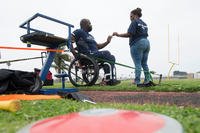Help for dealing with the deployment of a family member.
- Preparing for deployment
- Staying in touch when a family member has been deployed
- Helping children cope with the deployment of a loved one
- Coping with stress and anxiety when a loved one has been deployed
- Preparing for a homecoming
Maintaining a family routine and tending to your needs and those of your children can be very difficult when a family member has been deployed for military service. Children and adults may experience strong separation anxiety and fear about the well-being of a family member. It's important to come up with a plan for coping with separation and the strong emotions that may accompany a deployment.
Preparing for deployment
Families who know when a loved one is scheduled to be deployed should begin preparations right away. This process can include talking to children and extended family members about the deployment as well as adjusting routines and reviewing financial and legal details.
If you are preparing for the deployment of a family member you need to:
- Review child and elder care arrangements . If you need help covering your child or elder care needs, contact your employee assistance program (EAP), or other services that may be available to you through your employer, for support and resources. If you have a system in place, review it to make sure that the absence of a family member will not be a problem.
- Update and check legal and financial documents and details . This should include reviewing all health care procedures, updating wills and medical directives, and ensuring that family members have access to accounts and documents such as power of attorney agreements.
- Make sure all emergency contact numbers are posted in the home . Post information about how to reach family members when they are deployed and numbers for contacting appropriate military officials for information and updates.
- Discuss household finances and routines . If one person typically takes care of duties like car repairs, paying bills, or grocery shopping, make sure that the other feels comfortable assuming these new responsibilities.
Families should also prepare emotionally for a deployment and the stress it may cause by:
- Agreeing on a plan for communicating . Talk about whether you'll communicate by telephone, e-mail, or letters, and how often or at what times you'll communicate.
- Making a plan for being alone . Family members who are at home while a loved one is serving in the military may be able to deal with anxiety and fear if they make plans to take classes, pick up new hobbies, or spend time doing things they wouldn't normally do.
- Looking into support groups . Many branches of the service offer support in the form of social groups, counseling, or advice. Look into what's available for your family.
- Spending special time together . Take the time to be alone with your spouse or partner before they leave. It's also important for children to have individual time with a parent or loved one before deployment occurs.
Staying in touch when a family member has been deployed
It's vital to have a communication plan and stick to it. If someone is expecting letters or phone calls that never come, fear and anxiety could set in. Regular communication is extremely important because it can raise morale and help families cope with separation. Here are some ways to make communication even better:
- Be creative . Document a regular day in photos and send them to a loved one with captions. Create care packages with baked goods, silly toys or souvenirs, newspaper articles, children's school or artwork and video or cassette tapes of family members.
- Write frequent, short letters. Encourage children and friends to send postcards or brief notes. Constant communication from home can be very uplifting for those who are far away serving in the military.
- Don't avoid answering questions or write about rumors or gossip . Avoiding questions or passing along misinformation that may cause worry or fear. Try to keep communications full of news about friends, family, local events, and expressions of love.
Helping children cope with the deployment of a loved one
Children may find it very difficult to prepare for, and then adjust to the absence of a loved one who is called to duty. Some children may not understand why a parent or loved one has to leave, while others may be afraid for their safety. Some children may even be angry with a parent for leaving. It's important to keep talking to your child and monitoring how he is handling a separation. Many children may also benefit from consistent routines throughout the separation. When talking to a child about the deployment of a loved one you can:
- Help children understand they have not done anything wrong . Young children may think a parent is leaving because of something they've done. Try to explain that serving in the military is the loved one's job, just as going to the factory every day is what other parents may do for work.
- Talk about where their loved one will be and what they will be doing . Post a map where your child can see it. Talking about a loved one's daily routines may help children cope with separation.
- Be as honest and give as much information as possible . Children may have many questions about the military, and why their loved one has to leave. It's important to give them as much information as possible in words that they will understand.
- Make sure they don't feel like they have been abandoned . Telling a child that a loved one is "on assignment" or "at work" may help children understand why a loved one has left home.
- Limit television coverage related to your loved one's duty . Watching repeated media coverage of conflicts or wars that a family member is involved in could be emotionally draining. If your child is interested in watching television coverage try to do it together so you can answer questions and offer reassurance.
Ways children can communicate with loved ones
It's important for children to feel like they are keeping in touch with loved ones instead of hearing news or greetings second hand. Encourage your child to send artwork or write letters, and make sure that the family member who has been deployed sends e-mail or letters addressed and mailed directly to your child. This may help a child understand that her loved one is thinking about her. Here are some other ways to help children cope with the deployment of a family member:
- Have a parent or loved one read books or tell stories into a tape recorder that your child can listen to when they are gone . Some children may feel comforted by hearing the voice of a loved one reading or talking to them.
- Encourage even young children to add their notes to the end of your letters or write their own. Providing children with a stack of pre-addressed and stamped envelopes and paper may stimulate spontaneous letter writing.
- Keep track of the time for which a loved one will be gone . It may be helpful for children to keep track of their loved one's absence with a calendar or other visual aid. Be sure to tell children exactly when their loved one will be returning.
- Create a special photo album or scrapbook for children . Consider taking photos of your child and his family member doing ordinary activities and then gathering them in a small album. Children can take out their album whenever they feel lonely.
Coping with stress and anxiety when a loved one has been deployed
There are several stages of emotion you may go through when a loved one has been deployed. When they first are informed about a deployment, many people begin anticipating the extended absence of a loved one, which may cause feelings of confusion, anger, resentment, or depression.
If you experience any of these emotions you can:
- talk to your loved one about your feelings
- work to create opportunities for lasting memories during the separation
- involve your entire family in preparing for the deployment
When the time of departure draws near, some people may begin to feel detached or withdrawn. Feelings of hopelessness, impatience, and decreased emotional or physical intimacy are common reactions to an impending deployment. When a loved one leaves, family members may go through a difficult adjustment period. An increased sense of independence and freedom may be countered by periods of sadness and loneliness. If you have trouble adjusting to the absence of a spouse or loved one you can:
- Cultivate new skills or hobbies . Take a class or start a project you've always wanted to do. It's important to continue personal growth when a loved one has been deployed. Open yourself to new experiences and friendships
- Keep a journal . Many people find that writing down their thoughts and feelings is comforting when they are separated from a loved one.
- Offer empathy and support to others . Remember that you aren't alone. Find a support group or plan events with other families who are experiencing the same thing.
- Seek support from your faith community. Many people find comfort and solace from their faith communities during difficult times.
- Do something special for yourself and your family. Rent a movie or cook a meal that your loved one wouldn't necessarily enjoy. Plan fun outings with children during free time.
- Seek professional counseling . If you feel like you can't cope with the absence of a loved one, contact your health care provider or employee assistance program (EAP) to find a counselor.
- Ignore rumors . Many people have trouble dealing with limited information about the whereabouts and activities of a loved one during deployment. It may be difficult to ignore rumors or gossip, but it's important to rely on official sources of information when a family member has been deployed.
Preparing for a homecoming
Though it's a joyous time, many families may find themselves facing another adjustment period when a loved one returns from a deployment. As with preparations for departures, the entire family should be involved in preparations for returns. When a loved one returns from active duty some people may have resurfacing feelings of resentment, impatience, or increased anxiety. There will also be an adjustment period while family members begin renegotiating relationships and responsibilities. Here are some ways to adjust to a loved one's return:
- Communicate openly about your expectations and feelings.
- If the returning family member is a parent, brief him about household routines. If parents are up to date with information about things like what time children go to bed or what their new favorite television show is it will be easier to slip back into a parental role.
- Spend time getting to know each other again. Make a special effort to be together as a family or as a couple to re-establish relationships.
- Watch for signs of post-traumatic stress or difficulties returning to everyday activities. Some people may need professional counseling after serving in the military. If you need help finding a counselor, contact your health care provider or employee assistance program (EAP). If you do not know how to contact your EAP, ask your human resources department (HR).
Adjusting to changed family circumstances when a family member has been deployed can be very difficult. It's important to stay strong for your family and for yourself. Try to:
- talk about your feelings with a trusted friend, family member, or member of the clergy
- maintain healthy eating and sleeping habits
- continue communicating with your loved one on a regular basis





















